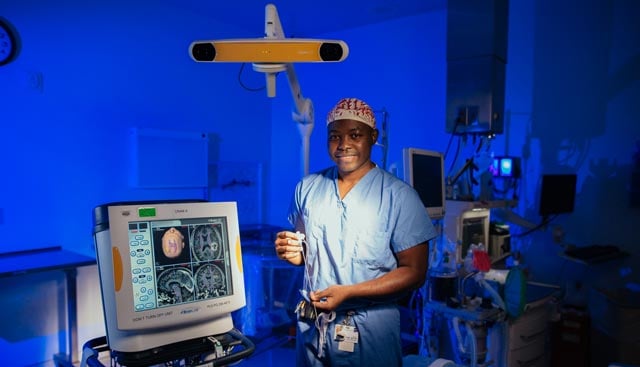Using a Biopsy to Diagnose a Brain Tumor

At Moffitt Cancer Center, we use a variety of methods to diagnose brain tumors, including biopsies. A biopsy involves removing a small portion of tissue from the body and then examining the sample in a laboratory for evidence of cancer. Depending on the circumstances of a patient’s condition, the specialists in our Neuro-Oncology Program may perform a neurosurgical biopsy, a liquid molecular biopsy or both to diagnose a brain tumor.
Neurosurgical biopsies vs. liquid molecular biopsies
During a neurosurgical biopsy, we remove tissue from a brain tumor and test it for cellular mutations. During a liquid molecular biopsy, on the other hand, we either draw a sample of the patient’s blood or extract a sample of his or her cerebrospinal fluid (CSF) via a spinal tap. Once we’ve obtained the sample, we test it to see if it contains circulating tumor DNA or circulating tumor cells.
In general, a neurosurgical biopsy is the preferable option for diagnosing a brain tumor, since tumors in the brain do not always produce a sufficient amount of diagnostic material in the blood or CSF. A liquid molecular biopsy may be more appropriate for types of cancer that grow in the CSF, such as lymphoma or other types of cancer that may spread to the CSF (for example, breast cancer or melanoma).
For more information
Medically Reviewed by Dr. Michael Vogelbaum, Program Leader, Department of Neuro-Oncology.
If you’d like to know more about how we can use a biopsy to diagnose a brain tumor, or about what the rest of our diagnosis and treatment process involves, call Moffitt Cancer Center at 1-888-663-3488 or complete a new patient registration form online.
